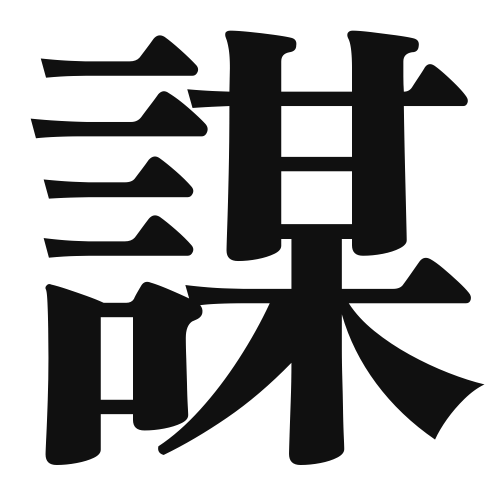1. Overview of Meaning
The kanji “謀” (mou) generally means “plot,” “scheme,” or “strategy.” It often refers to the act of planning or devising a strategy, especially in a cunning or secretive manner.
2. Formation and Radical
Formation of the Kanji: The kanji “謀” is a compound character, which means it is formed by combining different elements. It consists of the “言” (gen) radical, which relates to speech or words, and the character “毛” (mou), which can imply something like “to plan” or “to devise.” This combination suggests the idea of planning or strategizing through words.
Radical: The radical of “謀” is “言” (gen), indicating its connection to language and communication.
3. Examples of Usage
Common Words and Phrases: Some common words that include “謀” are “謀略” (mouryaku – strategy), “謀反” (mouhan – rebellion), and “謀殺” (mousatsu – conspiracy to murder).
Example Sentences in Daily Conversation:
- 彼は新しいビジネスのための謀を練っている。 (He is devising a scheme for a new business.)
- その謀は成功する可能性が高い。 (That plot has a high chance of success.)
4. Synonyms and Antonyms
Similar Kanji: A similar kanji is “計” (kei), which means “to plan” or “to calculate.” While both involve planning, “計” is more straightforward and lacks the secretive connotation of “謀.”
Opposite Kanji: An antonym could be “公開” (koukai), which means “to disclose” or “to make public,” contrasting with the secretive nature of “謀.”
5. Cultural and Historical Background
Relation to Japanese Culture: In Japanese culture, the concept of “謀” often appears in historical contexts, such as in samurai strategies or in literature where cunning plans are central to the plot.
Proverbs and Idioms: One relevant proverb is “謀は人にあり、成は天にあり” (Mou wa hito ni ari, naru wa ten ni ari), which translates to “Plans are made by man, but success is determined by heaven,” highlighting the balance between human strategy and fate.
